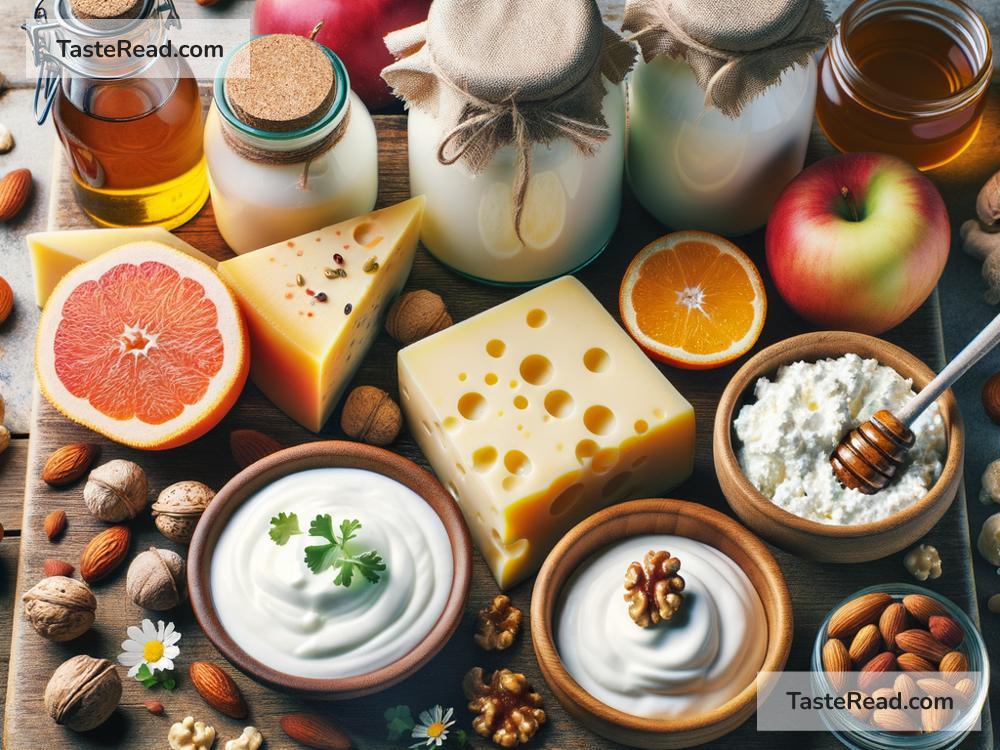Exploring the Role of Fermented Dairy Products in Health
Fermented dairy products, like yogurt, kefir, cheese, and buttermilk, have been part of human diets for thousands of years. They don’t just taste good—they’ve also been linked to various health benefits. In recent years, scientists and health experts have explored how these foods can improve our health in surprising ways. In this blog, we will look at what fermented dairy products are, how they are made, and the ways they can support our health.
What are Fermented Dairy Products?
Fermented dairy products start as regular milk but turn into something unique through fermentation. Fermentation is a natural process where beneficial bacteria and yeast transform the milk’s sugar (called lactose) into acids. This changes the texture, flavor, and nutrient profile of the milk. For example:
- Yogurt is made when specific bacteria—like Lactobacillus and Bifidobacterium—ferment milk, giving it a tangy taste and thick texture.
- Kefir is created using a mix of bacteria and yeast in kefir grains, producing a drinkable, slightly fizzy dairy product.
- Cheese comes in many forms, depending on the bacteria and techniques used during fermentation.
- Buttermilk (the cultured kind) is a liquid product made when bacteria ferment milk and create a mild, tangy flavor.
These products often have something special that regular milk does not: live cultures, or “probiotics,” which are good bacteria that can benefit your gut and overall health.
Why Does Fermentation Matter?
Fermentation does more than change the taste and texture of dairy—it improves its digestibility and nutritional value. People who have trouble digesting lactose (the sugar in milk) often find fermented dairy more manageable. This is because the fermentation process breaks down lactose into simpler components, making it easier for the body to process.
Fermented dairy also contains vitamins, minerals, and bioactive compounds that are important for health. These include calcium, protein, and vitamin B12, which help keep bones strong, muscles working, and energy levels high. Plus, the probiotics found in fermented dairy can support gut health, and as scientists are learning, gut health is key to overall wellness.
How Fermented Dairy Products Support Health
1. Improved Digestion
One of the best-known benefits of fermented dairy products is better digestion. Probiotics help balance the bacteria in your gut, which can improve how your body processes food. If you ever feel bloated, have an upset stomach, or suffer from irregular bowel movements, adding products like yogurt or kefir to your diet could help.
Studies have shown that probiotics in fermented dairy products may also help people with irritable bowel syndrome (IBS), a common digestive condition.
2. Boosting Immunity
Healthy gut bacteria play an important role in your immune system. Probiotics from fermented dairy products can strengthen your gut barrier, helping your body fight off harmful bacteria, viruses, and other invaders. Regularly consuming these foods may make you less likely to get sick or may shorten the time it takes to recover when you do.
3. Bone Health
Milk and dairy are known for being rich in calcium, which is essential for strong bones. Fermented dairy products boost bone health even more because they often contain other nutrients, like magnesium and vitamin K2, which help your body use calcium effectively. For older adults, who are at higher risk for osteoporosis, eating cheese or yogurt regularly could help reduce the risk of bone fractures.
4. Heart Health
Some fermented dairy products, particularly certain types of cheese, may be good for heart health. They contain bioactive compounds that can help lower some forms of cholesterol and improve blood pressure. While cheese is high in fat, research shows that high-quality fermented cheeses may have health benefits when eaten in moderation, rather than contributing to heart disease as some once thought.
5. Mental Health
The connection between the gut and the brain is an exciting topic in health research. Scientists call it the “gut-brain axis,” and it means that what you eat can influence your mood, memory, and mental health. Probiotics in fermented dairy products may help reduce anxiety, depression, and even cognitive decline as you age.
Are There Any Downsides?
While fermented dairy products are full of benefits, they are not for everyone. Some people are allergic to milk proteins or are heavily lactose intolerant, which means even fermented dairy might not suit them. Additionally, certain products—like flavored yogurts or processed cheeses—can contain added sugar, preservatives, or excess salt, which reduce their health benefits. Always check the label and aim to buy plain, minimally processed options.
How to Add Fermented Dairy to Your Diet
Incorporating fermented dairy products into your routine is easy and delicious! Here are a few ideas:
– Start your mornings with yogurt and add fresh fruit or nuts for extra nutrients.
– Drink a glass of kefir as a refreshing snack or smoothie base.
– Add a dollop of cultured sour cream or buttermilk to soups, salads, or baked dishes.
– Enjoy a slice of high-quality cheese paired with whole-grain crackers as a treat.
Remember to start slowly if you’re new to fermented dairy, as your gut may need time to adjust to the probiotics.
Conclusion
Fermented dairy products are not only delicious but also packed with nutrients and probiotics that can improve digestion, immunity, bone health, and even mental well-being. By making these foods part of your daily diet, you can enjoy their unique flavors while supporting your health naturally. Just remember to choose high-quality, minimally processed options for the best results. Whether you scoop up a spoonful of yogurt, sip on kefir, or savor a slice of cheese, fermented dairy can be a powerful ally for a healthier you!


